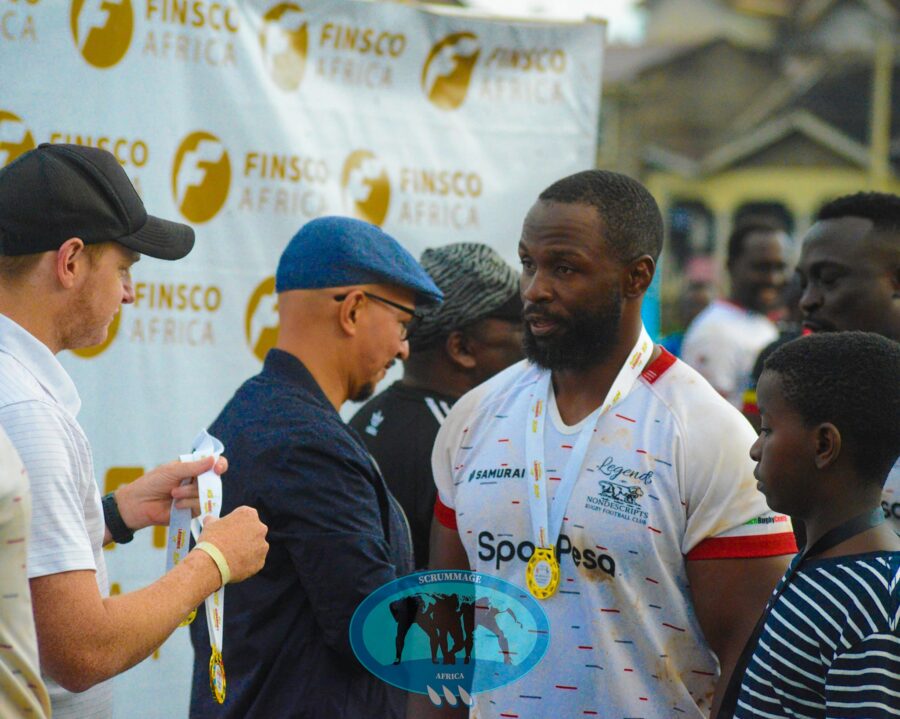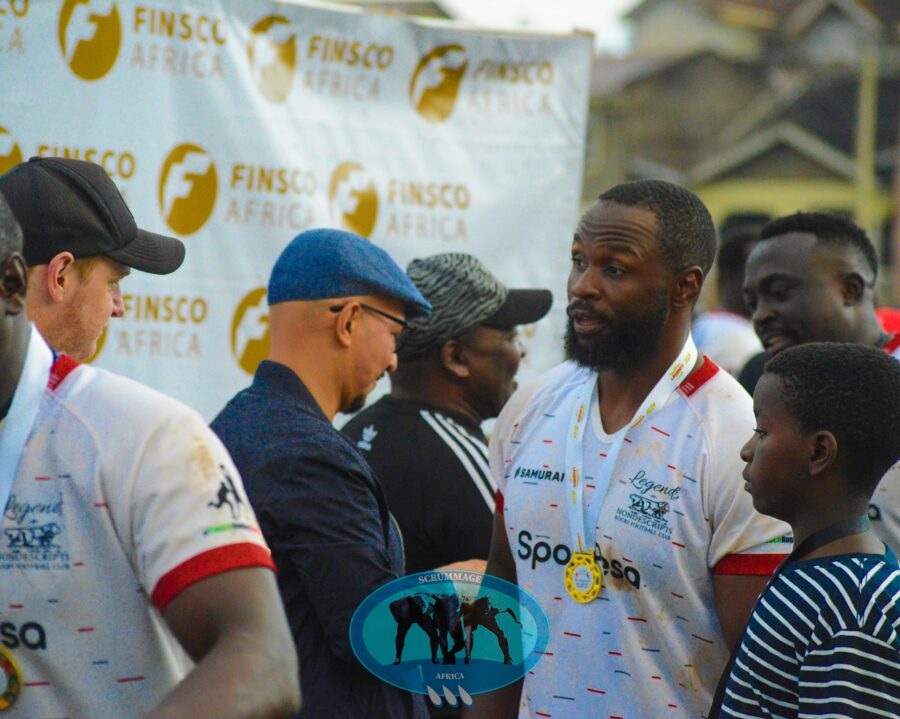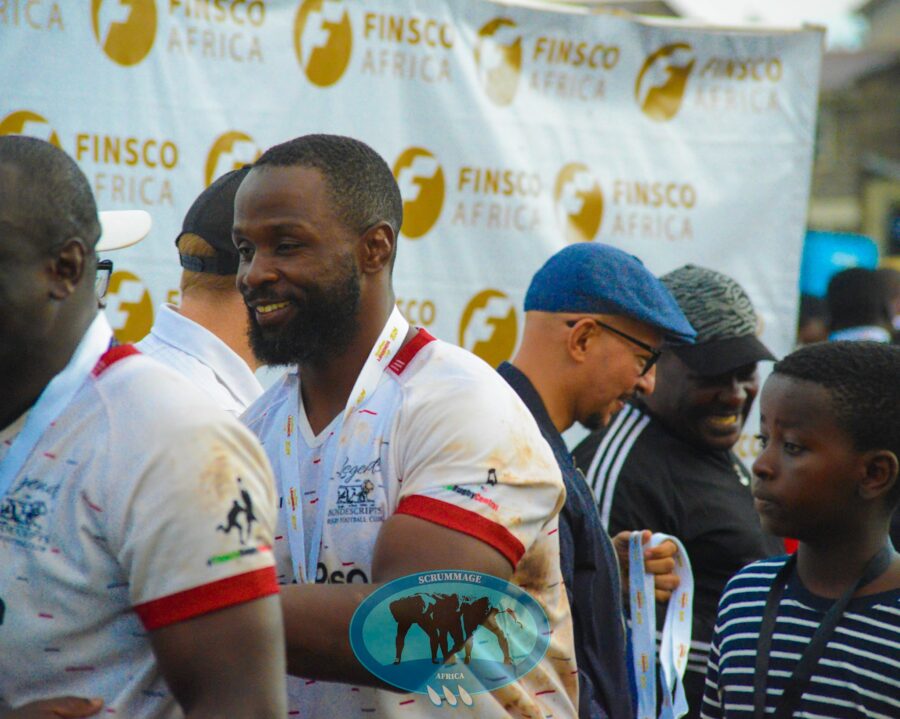Many know John-Allan Namu as one of Kenya’s most respected investigative journalists, particularly for his compelling pieces on The Inside Story.
But before captivating audiences with hard-hitting journalism, few were aware that he was once a dedicated rugby player.
John-Allan Namu at Saints
In an exclusive sit-down with Scrummage Africa, Namu — now the CEO and co-founder of Africa Uncensored, an investigative journalism outlet based in Nairobi — opened up about his rugby journey, which began during his high school days.

John-Allan Namu after receiving the Legends Cup winning medal. PHOTO/Mahlon Lichuma
“I had the privilege playing for and alongside a lot of rugby greats in this country. Some of my colleagues included Allan Hicks, Charles Cardovillis. One of my contemporaries went on to become a prolific player in Kenya rugby sevens, Ben Nyambu, who plays the role as coach at Nondescripts RFC. I rose through the ranks to captain of the squad in the 2001–2002 season,” he told Scrummage Africa.
“2003 to 2005 season, while we weren’t successful, I had my own personal successes within the club. I was nominated young player of the year in 2004 and 2005 as a player of the year, my final season. I also obeyed a call to represent Kenya Simbas, starting off the bench mostly, but I was honoured to have done,” he stated.
Namu said he had to quit rugby because of the commitments that come with professional journalism, which left him with minimal time. However, he admits that he misses the sport and wishes he could have played one or more seasons.
“I also had passion for journalism and while also at Nondies I was in the University. While I was at University I had the time to develop my skillset and do all the things that I needed to develop myself as a rugby player. I wish I had more time but the profession of journalism requires more time than I could spare to continue with rugby. When I look back, maybe I could have budgeted my time and had one or more seasons but it’s a sacrifice I am glad that I made. I think the investment in terms of time has paid off in various ways. But I do miss rugby, I do follow local leagues and am an avid supporter of Nondies,” he said.
The 2024 ICFJ Knight International Journalism Award winner praised Nondies’ performance this season, calling it phenomenal for a side that has just been promoted back to the Kenya Cup.
“Look at their performance this year — it has been nothing short of phenomenal after just a season from relegation to being the squad that has met Kabras in the semis, with Nondies being the only amateur side in the semis.”
EDITOR’S PICKS:
- Why Patrick Odongo Okong’o feels indebted
- List of rugby prospects from high school
- Colman Were keen to redefine Kenyan rugby’s physical edge
- Follow Scrummage Africa on Facebook
On the changes in the sport since his playing days, he observed:
“There is quite a bit on development, rules have changed, more focus on safety, tackle areas and the contact situation. Size of rugby players has improved.”
Namu believes that rugby has become a national ambassador and said it is high time the Kenya Rugby Union dealt with corruption within the sport
“I think Kenya 7s’ impact helped build a profile for Kenya. Rugby is a sport that has become almost like an ambassador for the country. I would say what we need to do at the Kenya Rugby Union is to cut all the crap with corruption. It is incredibly embarrassing that in this day and age we have directors from different parts of the country who are embezzling funds directly from players. We have the same allegations of coaches taking per diems from players so that they can make it to the squad.”
“Rugby is an incredibly hard sport, people work hard to make those teams. People dream of achieving success — in the same way that the Khayange brothers, or Simiyu brothers, or the many people we’ve had across the space of time. And to deny people that opportunity because you want to make a few shillings… it’s shameful, it’s really shameful!”
“Rugby is a sport where people who play are men of honour, but the dishonourable things I have seen happening are displeasing.”
John-Allan Namu on professionalization
He added that it’s time more teams are supported in professionalizing and that Kenya should have higher standards.
“I believe by this time it shouldn’t be only three teams that are able to attract funding and support to professionalise. Kenya should be one of the best rugby-playing nations consistently. We shouldn’t be competing with Uganda — not to disrespect Uganda — our objective should be competing with the Springboks. We should consistently beat Namibia, have players playing in the French league, South Africa, the United Kingdom, and also have an incredibly strong local league. All of our success started with local leagues — and that is straight down from age-grade rugby.”
Namu expressed his appreciation for leaders like Paul Odera, Director of Kenya Rugby Union:
“I have occasion to have been coached by Paul, I have occasionally observed the kind of philosophy that he brings to the squad — those are the people that we require in order to change the sport,” he added.
He emphasized the importance of grassroots sports structures:
“Any sport needs to have support at the grassroots level. If you see the structure of village football tournaments, especially in Western Kenya, we have very robust football leagues at the village level, sub-county level, county level, and even good age-grade for football. That’s the model that we need to embrace. This should be something that children across the country wake up on Saturdays and Sundays and should be allowed to play. It should be part of the curriculum, should be part of the sports program in our schools.”
“We need to have stadiums like Bukhungu calling people to play rugby. We need to disabuse this notion that rugby is a violent sport. Yes, it’s a contact sport.”
“You can’t win rugby today because you’re big and strong. Rugby is a game of intellect — and that intellect is both studied and experienced.”
When asked if corruption contributes to the stagnation in sports, Namu did not hold back:
“In large part, I believe corruption has affected our sports. I remember from my playing days — whether it was corruption or not — I played two years of top-flight rugby, it was like Ksh500 or Ksh1,000. I never got paid; I was there because I was passionate. And now there are some monies that are coming into rugby and there are people looking at it purely as an opportunity to enrich themselves — that is the kind of culture we must stamp out. Look what it has done to football, look at what it has done to other sports.”
“People think they own the sport and they use it as a tool to enrich themselves. People personalise the sport too much — by the time they realise it, they’ve destroyed the sport. I have seen it in hockey, swimming, basketball, volleyball, and cricket. In the 70s, we used to be successful as a nation. We don’t all have to be lawyers or doctors — why can’t we be sportsmen?”
Namu called on retired players to invest in mentoring young players, especially in areas of life beyond the game.
“I have been away actively for a while, but from a distance, I think the older players need to invest time back in the club. This is what I admire most about Nondies — it has a very strong playing unit and a strong group of former players who give time, energy, effort — not just in terms of ensuring they make it to the matches, but in terms of mentorship. Like, how do you lead yourself as a man? How do you become a man beyond the sport?”
He credited Nondies for shaping him into the person he is today.
“I benefitted myself from the mentorship of Hicks, Branco Ominja, Auka Gecheo. There are so many people that poured into me their experience — that made the person I am today. That is why I love the club and that is why I believe the Nondies model is something to look into,” he said.

John-Allan Namu during the legends Cup. PHOTO/Mahlon Lichuma
Namu believes that rugby, if well-structured, can become an economic driver.
“As much as a lot of cleaning is needed in rugby, rugby is a beautiful sport. It is a sport we have shown we can excel in. It is one that can drive not just futures of individuals but economies — of a region if not the entire country.”
“Western Kenya should be the spiritual home of rugby just for the sheer amount of raw talent that comes from here. But we haven’t tapped into other parts like the Coast region, Central, and North Eastern. We don’t think about rugby as a sport that can change the lives and fortunes of millions of people. I am a big believer in that — but we must get the fundamentals right,” he concluded.



